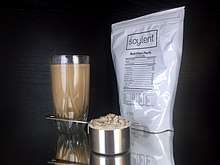Meal replacement
A meal replacement is a drink, bar, soup, etc. intended as a substitute for a solid food meal, usually with controlled quantities of calories and nutrients. Some drinks are in the form of a health shake. Medically prescribed meal replacement drinks include the required vitamins and minerals.[1] Bodybuilders sometimes use meal replacements, not formulated for weight loss, to save food preparation time when they are eating 5 to 6 meals a day.[2]

In the European Union, weight-reduction meal replacements intended either to supplement ("Meal replacement for weight control") or to replace totally ("Total diet replacement for weight control") normal meals are regulated as to their energy content, the nutrients they must provide, and information and advice on packaging by EU Directive 96/8/EC of 26 February 1996 on foods intended for use in energy-restricted diets for weight reduction.[3] For example, a meal replacement must provide between 200 and 400 food calories of energy, of which not more than 30% from fat, and not less than specified amounts for various vitamins and minerals. Labeling information is prescribed, and packaging must provide information such as a statement that the product should not be used for more than three weeks without medical advice. This protects users of meal replacements without other food from inadvertent malnutrition.
In the United States, the term "meal replacement" is not defined in federal Food and Drug Administration regulations, but generally refers to a calorie-controlled, prepackaged product in the form of a bar or beverage (ready to drink or powder), that replaces a regular meal. Meal-replacement products usually provide 200 to 250 calories per serving, are fortified with more than 20 vitamins and minerals at "good" or "excellent source" levels and often bear nutrient content claims, such as percent fat free and reduced sugar. Meal replacement products can be regulated as conventional or functional foods.[4] In Canada, meal replacements are regulated by the Canadian Food Inspection Agency and must meet minimum calorie, protein and vitamin requirements, causing some American products to be rejected.[5][6]
In popular culture
Meal replacements have been a regular feature of science fiction, especially the space travel genre, at least since the film Santa Claus Conquers the Martians (1964) and TV's Lost in Space (1965).
Regulations
EU
In the EU countries, meal replacements are divided into two categories: food supplements for weight control and preparations that completely replace conventional food for the same purpose. The nutrients that make up the mixtures are regulated by Directive 96/8 / EC of February 26, 1996, "About food products intended for use in low-calorie diets to reduce weight" [7]. For example, meal replacements should provide between 200 and 400 calories of food energy, of which fats account for no more than 30%, and should contain at least a specified amount of various vitamins and minerals. The label should be an indication of the inadmissibility of use for more than three weeks without consulting a doctor, which protects consumers from accidental malnutrition.
USA
In the US, the concept of "meal replacement" is not defined by the rules of the Food and Drug Administration. As a rule, this concept refers to controlled-calorie foods marketed as bars, beverages or powders. Meal replacements usually contain from 200 to 250 calories per serving with the addition of 20 or more vitamins and minerals and low fat and sugar.[8]
Effectiveness
There is some evidence that the meal replacement diet are effective for weight loss of obese individuals. Lean body mass is better preserved than with very-low-calorie diets, a related kind of diet but unregulated and potentially with unbalanced and insufficient nutrients formulations.[11][12]
Meal replacements can be used to treat diabetes by maintaining weight loss. According to the American Diabetes Association (ADA), meal replacement products can be used once or twice a day, in lieu of regular meals, to maintain weight loss for individuals with diabetes. However, that weight loss can only be maintained as long as the individual keeps up with the meal replacement plan.[13]
The effects of meal replacements on weight loss for individuals with mental illness, such as schizophrenia, schizoaffective disorder, bipolar disorder, are inconclusive.[14]
See also
- Energy bar
- Infant formula
- Liquid diet
- Therapeutic food
References
- Drink Yourself Skinny, Men's Health, archived from the original on 2009-12-13
- Meal Replacement Guide, Bodybuilding For You
- EC Directive 96/8/EC on foods intended for use in energy-restricted diets for weight reduction
- "Regulatory Issues: Meal Replacements – Convenience or Compromise?". Food Processing.
- Axon, Samuel (23 October 2017). "Canadian regulators have blocked Soylent, producers say". Ars Technica. Retrieved 24 October 2017.
- "Meal Replacements". Canadian Food Inspection Agency. 2014-02-28. Retrieved 24 October 2017.
- EC Directive 96/8/EC on foods intended for use in energy-restricted diets for weight reduction
- "Regulatory Issues: Meal Replacements – Convenience or Compromise?". Food Processing.
- Axon, Samuel (23 October 2017). "Canadian regulators have blocked Soylent, producers say". Ars Technica. Retrieved 24 October 2017.
- "Meal Replacements". Canadian Food Inspection Agency. 2014-02-28. Retrieved 24 October 2017.
- Thom, G; Lean, M (May 2017). "Is There an Optimal Diet for Weight Management and Metabolic Health?" (PDF). Gastroenterology (Review). 152 (7): 1739–1751. doi:10.1053/j.gastro.2017.01.056. PMID 28214525.
- Heymsfield, SB; van Mierlo, CA; van der Knaap, HC; Heo, M; Frier, HI (May 2003). "Weight management using a meal replacement strategy: meta and pooling analysis from six studies". International Journal of Obesity and Related Metabolic Disorders. 27 (5): 537–49. doi:10.1038/sj.ijo.0802258. PMID 12704397.
- Craig, J. (15 August 2013). "Meal Replacement Shakes and Nutrition Bars: Do They Help Individuals With Diabetes Lose Weight?". Diabetes Spectrum. 26 (3): 179–182. doi:10.2337/diaspect.26.3.179.
- Gelberg, Hollie A.; Kwan, Crystal L.; Mena, Shirley J.; Erickson, Zachary D.; Baker, Matthew R.; Chamberlin, Valery; Nguyen, Charles; Rosen, Jennifer A.; Shah, Chandresh; Ames, Donna (December 2015). "Meal replacements as a weight loss tool in a population with severe mental illness". Eating Behaviors. 19: 61–64. doi:10.1016/j.eatbeh.2015.06.009. PMID 26172565.
External links
- A Brief History of Meal Replacements, Julian Hearn, 5 November 2014.